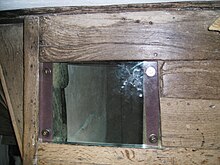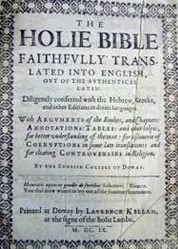Matthew 6:1-34 – The Nazarene’s Commentary on Leviticus 19:18 Continued 2 Prayer and neighbour love
(#Mt 6:5-13) b) Prayer and neighbor love
|| Luke 11:2-4
MT6:5 “And, when you pray, be not as the hypocrites. For they like to pray standing in religious gatherings and in town squares to be viewed by others.[1] I tell you the truth: They have their full reward! MT6:6 But, you, when you pray, enter your private room and shut the door praying to your Father secretly.[2] And, the Father watching secretly will reward you.[3] MT6:7 But, praying, do not babble many words as the Non-Jews. For they think by uttering many words[4] they will be heard. MT6:8 So, you should not be like them. For The God your Father knows[5] what you need[6] before you ask. MT6:9 So, pray:[7]
Our Heavenly Father,[8]
Let your Name be sanctified.[9]
MT6:10 Let your Kingdom come.[10]
Let your Will take place,[11] as in heaven, also on earth.
MT6:11 Give to us our bread today.[12]
MT6:12 Forgive our debts[13] as we forgive those in debt to us.[14]
MT6:13 Bring us not into temptation[15] but rescue us from evil.[16]
[1] To be viewed by others: Compare Matthew 6:16: appearances. Various renderings: BAS: like the false-hearted men; PHI: like the play-actors; RHM: shine before men; WMS: to attract the attention of people.

1581 Psalter with Rose Warm sunlight streams down on this ancient prayer book, bible and psalter, open to the Lord’s Prayer set to music. A rose lies on the open book. (Photo credit: Wikipedia)
[2] Praying to your Father secretly: See Luke 6:12: privacy. Various renderings: WEY: into your own room; NEB: into a room by yourself; RHM: and fastening thy door; BECK: who is with you when you are alone; PHI: pray to your Father privately; PHI: who sees all private things. Remember that even Jesus on occasion wandered off some distance from his disciples when praying.
The relationship with ‘love your neighbor’ in private prayers rather than a showy display is the affect such hypocritical prayers have on your neighbor. You give the impression you take yourself too seriously and judge your neighbor to be less “spiritual” than yourself. A private prayer in a cafe or restaurant without show is heard just as easily, or more so, by the Father.
[3] The Father watching secretly will reward you: The Nazarene does not explain what this “reward” is, only that it will occur. This requires “faith,” a word only occurring one time in this sermon (Matthew 6:30) and only in reference to his disciples – “little faith.”
[4] Uttering many words: Either “babbling” or “wordy”. Various renderings: GDSP: do not repeat empty phrases; WMS: repeating set phrases; PHI: don’t rattle off long prayers; NEB: do not go babbling on. For thousands of years religious worshippers have resorted to long prayers filled with a multitude of repetitions. Even the Nazarene’s famous prayer (the Lord’s Prayer, or Our Father, pater nostra) has come in for many repetitions though Jesus counseled against that. Some Asian religions use prayer wheels, beads, and flags to continue their repetitions.
[5] Your Father knows: See Matthew 6:32: needs; and, Luke 12:30: Father knows.
[6] What you need: “Needs” not “wants.”
[7] Pray: This most famous prayer outlines what we call Nazarene Principles.
[8] Father: The First Principle. The word “father” occurs 1,180 times in the OT in a family or secular context but less than 15 times in a religious or spiritual relationship. Most of these apply to the Messiah, leaving only a handful with reference to the Saints. The idea is rare in Judaism but “father” occurs 134 times in the Gospel of John. In the Mountain Teachings Jesus uses “your Father” 8 times, “our Father” 1 time, and “my Father” 1 time for a total of 10 occurrences.
Dictionary of New Testament Theology, Volume 1, page 615:
“In the oldest version of this prayer, the invocation reads pater, (dear) Father, and indicates abba as the Aramaic original. This means that when Jesus gave his disciples the Lord’s Prayer, he gave them authority to follow him in addressing God as abba and so gave them a share in his status as Son.”
Dictionary of New Testament Theology, Volume 1, page 617:
“The description of God as Father never refers to any other individual or to mankind in general. To be a child of God is not a natural state or quality.… In Palestinian Judaism of the pre-Christian period the description of God as Father is rare. The Qumran texts provide but a single example.… We have yet to find an example of an individual addressing God as ‘my Father.’… Jesus did not teach the idea that God is the Father of all men.… It must have been nothing short of outrageous that Jesus should make use of the completely unceremonious Aramaic word abba.”
For more information search the words “sons,” “children,” “born,” or “begotten” in a concordance or computer program.

Almost all of Mark’s content is found in Matthew, and much of Mark is similarly found in Luke. Additionally, Matthew and Luke have a large amount of material in common that is not found in Mark.
Let your Name be sanctified: The Second Principle. The Nazarene does not use the opportunity to incorporate the noma sagrada or Divine Name (YHWH = Jehovah; Exodus 3:15) in his model prayer. Jesus uses the words “your name” with reference to the Father rarely in the Synoptic Gospels. In John the Nazarene uses the expression at John 12:28 and John 17:6, 26. However, he never uses or pronounces YHWH in these contexts. Why? In Jesus’ day the Jews refrained from uttering the name YHWH and substituted Elohim (God) or Adonay (Lord). The Jews never removed YHWH from its nearly 7,000 occurrences in the Old Testament. About the year 1,000 AD Jewish copyists began to incorporate vowel points in YHWH to warn to say God or Lord in its place.
Does the Nazarene ever use YHWH? The Gospel evidence would indicate this could only be when he is quoting the Hebrew Bible. It is now thought that the Greek version of the Hebrew Bible, known as The Septuagint (LXX), had YHWH untransliterated in the Greek text. There is a good reason for this. The Greek language cannot convert the Hebrew letters for YHWH. Modern Greek dictionaries use dzehoba or Iekhoba for “Jehovah” but original Greek did not have an “h” as it were, other than a breath sound. Modern Greek attempts to capture the sound of the English pronunciation of the name.
Given the attitude of the Jews what would have happened if Jesus used YHWH in quotes or normal speech? Certainly equal to that misguided accusation that he violated the Sabbath! Yet the Gospels are silent on this. What about private meetings with his disciples when the use of YHWH could not cause a public stir? Compare the lengthy closing words in John chapters 13 to 17. Not once does Jesus use YHWH even though he alludes to the “name” four times.
Given the facts that the Jews do not attack him for violating their understanding of one of the Ten Commandments and the absence of his use in private speeches and prayers, it would seem he respected the Jewish tradition of the time.
This does not minimize the importance of the “Name” as Jesus’ words in his prayer shows. The idea of this sanctification occurs scores of times in the Hebrew Bible. Compare Exodus 3:14, 15 and 6:3.
Various renderings are: TCNT: May thy name be held holy; MOF: thy name be revered; PHI: may your name be honored. For more information on this subject see Nazarene Principles.
[10] Let your Kingdom come: The Third Principle. After the subject of the “Name” in the Hebrew Bible with its 7,000 occurrences of YHWH, the next most important topic is the Kingdom. The Messiah and his “kingdom” are inseparable (Note Psalm 2 and 110 as well as Daniel chapters 2 and 7). In the Nazarene’s teachings there are two “kingdoms”: the Son’s and the Father’s (Matthew 13:41, 42). The “kingdom” here in his prayer is the Father’s.
“Kingdom” is a word used often by the Nazarene. The word occurs 55 times in Matthew, 23 times in Mark, 45 times in Luke and 5 times in John.
When does the Nazarene begin to reign? The Second Psalm is quoted by Peter at Acts 4:24, 25 and Paul at Acts 13:33 and applied to the resurrection and ascension of Christ in the year 33 AD. This was in fulfillment of Psalm 110:1 (Note 1 Corinthians 15:24-28). Daniel chapters 2 and 7 would argue this kingdom’s beginning is during the reign of the “fourth kingdom” or Rome (Daniel 2:44; 7:9-14). Upon his ascension the Nazarene took up his Power as described by Paul at Ephesians 1:20-23.
Upon the Return or Arrival (parousia) of the Son of Man, and his gathering to himself his Saints, there will be a milestone in the King’s rule (Matthew 24:3, 30; John 14:2,3; Acts 1:9-11; 1 Thessalonians 4:15-17; Revelation 11:18; 12:10).
[11] Let your Will take place: The Fourth Principle. The “kingdom” is the agency by which the “Name” is sanctified and the “eternal purpose” (Ephesians 3:9, 10) or will of the Father is accomplished (Psalm 72; Daniel chapters 2, 7). God’s original purpose was for a global paradise (Genesis chapters 2, 3). His Will has not changed (Isaiah 45:18; 55:11). Messiah and his Saints will rule the earth (Psalms 2, 110; Daniel 7:13, 27; 1 Corinthians 6:2; Revelation 5:10; 20:4, 6). The earth will never be destroyed (Psalms 104:5; Ecclesiastes 1:4; Psalm 72:8). The City of God will one day descend out of heaven to rule the earth for 1,000 years (Revelation 20:4, 6; 21:1-5).
God has a “will” or purpose for “heaven” as Daniel 4:35 shows. This will for “heaven” will be realized by virtue of the Son and the Messiah’s Church (Ephesians 1:10; 3:9, 10 Colossians 1:20).
[12] Give to us our bread today: The Fifth Principle. The first four Principles of the Nazarene’s prayer deal with God, the last three deal with the individual disciple. The first of these, or the Fifth Principle, deals with that necessary bread for each day (Psalm 37:25). This is not “daily bread” but “bread for today.” From the Nazarene’s viewpoint it would be materialistic to pray for tomorrow’s bread (Matthew 6:33, 34).
Various renderings: ALF: our needful bread.
Prayer for “today’s bread” does not guarantee a disciple may not go hungry on occasion. Compare 2 Corinthians 11:27 and Matthew 25:37 (Philippians 4:11-13). Some see the daily offering of loaves at the Temple here.
Dictionary of New Testament Theology, Volume 1, page 251:
“Origen suggested that we should understand it as eip ten ousian (the bread) necessary for existence. It can be supported by reference to Proverbs 30:8 and it reminds us of Exodus 16:4. The Israelites were to gather only so much manna as they needed for ‘the day.’”
[13] Forgive our debts: The Sixth Principle (Luke 11:14). Various renderings: WEY: shortcomings… those who have failed in their duty towards us; PHI: forgive us what we owe to you as we have also forgiven those who owe anything to us. Note there is the tax collector’s tone here as earlier in debits, credits and rewards. Not only are financial debts canceled but moral and emotional debts as well (Romans 13:8: owe only love).
Forgiveness is a kissing cousin to agape or that love which has an unselfish, even selfless, interest out of pure motive for others. The word group “forgive” occurs 48 times in the Gospels (1 Corinthians 13:5: log, or, keep account; LOGIZETAI). Such forgiveness cannot be separated from love of neighbor. Such a quality ought to characterize the Nazarene Saint.
[14] Debt to us: This may be moral or emotional indebtedness but it also may be literal monetary debts (Luke 6:34). One of the clearest ways to judge a man is by his wallet and how he uses it in relation to his dealings with others. When it comes to spirituality, the use of money from the standpoint of God separates the men from the boys.
[15] Bring us not into temptation: The Seventh Principle. Various renderings: BAS: let us not be put to the test. This is a subject the Nazarene knows something about (Matthew 4:1; Luke 4:1; 22:40; Hebrews 4:15). The word group “tempt” occurs 36 times in the Bible and 14 times in the Synoptics, but not once in John. A related word “test” occurs 113 times in the Bible with 11 in the Gospels. Compare 1 Corinthians 10:13.
1 Corinthians 10:13 and James 1:13 are good commentaries on the Nazarene’s words. God does not tempt or test one with evil, so He does not cause a prostitute pass before a man to test him. The Temptation of Christ had two phases: a beginning and an end. At the beginning he was tempted (tested) by Satan (Matthew 4:1-11; Luke 4:1-13). These tests or temptations dealt with doubt in the word “if,” as well as greed and pride. The later test was manifest at the end of his life beginning in the Garden of Agony and finally, the Tree (Hebrews 4:15). Test or tempt really find their best definition in the word “endurance.”
[16] Evil: Some render the Greek PONERON as either “evil,” “wicked,” or Wicked One, alluding to the Devil (Matthew 4:1; Luke 4:1).
+
Preceding articles
Matthew 6:1-34 – The Nazarene’s Commentary on Leviticus 19:18 Continued 1 Charity and neighbour love
Be sound in mind and be vigilant with a view to prayers
Praying is surrendering in all circumstances
Praying and acts of meditation without ceasing
++
Additional reading
- Looking for True Spirituality 6 Spirituality and Prayer
- If your difficulties are longstanding, try kneeling
- Trusting, Faith, calling and Ascribing to Jehovah #1 Kings Faith
- Trusting, Faith, Calling and Ascribing to Jehovah #5 Prayer #2 Witnessing
- Trusting, Faith, Calling and Ascribing to Jehovah #6 Prayer #4 Attitude
- Trusting, Faith, Calling and Ascribing to Jehovah #9 Prayer #7 Reason to pray
- Trusting, Faith, Calling and Ascribing to Jehovah #10 Prayer #8 Condition
- Trusting, Faith, Calling and Ascribing to Jehovah #11 Prayer #9 Making the Name Holy
- Trusting, Faith, Calling and Ascribing to Jehovah #16 Benefits of praying
- Not able to make contact with God because to busy
- Give Thanks To God
- Get into the habit of dealing with God about everything
- Israel, Fitting the Plan when people allow it
- Running challenge and the City build by the Most High Maker
- Jerusalem and a son’s kingdom
- Jesus … will come in the same way as you saw him go
- Tapping into God’s Strength by Waiting on Him
- A Living Faith #5 Perseverance
- God should be your hope
+++
Further reading
-
-
- The Good Neighbor
- 7 Habits That Distinguish Believers from Professing Christians (part 4)
- Should Christians Meditate?
- Are You Praying?
- Keep Praying!
- My Prayer for 2014
- Daily Bible Verse:John 14:6
- Jesus, Light of The World Praying the Scriptures through Advent Book
- Waiting On God
- In All Honesty
- Wait for it………….
- What Jesus is Praying For (May 12)
- Praying in the dark 1
- Praying in the dark 2
- Bend Your Head so You Can Stand Your Ground
- That’s it, I am Angry and I am Praying
- praying for hard things
- Unmasked
- I Believe in Praying ~
- Praying Hands
- Meditation/Betty’s Verse Of The Day/1-22-14
- Why Nothing Is Worth Grieving The Holy Spirit
- I’m Praying!
- Praying for God Peace ~
- Childlike praying
- Praying Through
- March 16 – Keep on praying
- Praying Scripture for strength and courage
- Seven lessons from Jesus’ prayer for us all…
- “Till death” (NOT)
- Kesha Takes the High Road in Powerful New Single, “Praying”
- My Personal Prayer
- Pray with love in your heart
- Today’s Thought: Why We Dare
- The Benefits of Praying in Public
- Let’s step up our prayer game
- Today’s Thought: The Invited Name
- Why praying is important
- The Bible uses different Facets to convey the meaning of Kingdom of God
- The Kingdom Of Heaven And The Kingdom Of God Compared And Contrasted
- Shadows of Messiah – Astronomy
- Into God’s Kingdom for New Jerusalem
- New Jerusalem: God’s House Becomes a City
- Christ, God’s House, God’s City, the Earth
- New Jerusalem, City of the Living God
- New Jerusalem, City of the Living God (2)
- The Glory of God
- Seek His Kingdom
- The Kingdom of God and the Marriage of the Lamb
- What Brings Us Near to the Kingdom of God?
- The Bilateral Ekklesia vs. The Kingdom of Heaven
- The Sermon on the Mount (Matthew 5-7) – Pt. 4
- Luke 14:15-24
- All Things Are Possible with God
- The Power of Prayer
- “Seek first the kingdom of God and his righteousness.”
- “Unless one is born of water and Spirit he cannot enter the Kingdom of God.”
- Summer in the City of God
- Jerusalem Jubilee
- The City of the Church
- Come let us Grow Together: The City of God
- The LORD of hosts is with us
- God is within her
- There is a River
- The City of the Great King
- The City of God – The Preface
- 66. A City to Come
- The Kingdom of Heaven
- Protection and Covering
- The Kingdom of God
-
+++

















































 Bijbelvorsers Webs
Bijbelvorsers Webs Belgische Vrije Christadelphians / Belgian Free Christadelphians – Old Google Main Website
Belgische Vrije Christadelphians / Belgian Free Christadelphians – Old Google Main Website Christadelphian Ecclesia
Christadelphian Ecclesia Hoop tot Leven – Redding in Christus
Hoop tot Leven – Redding in Christus
Recent Comments